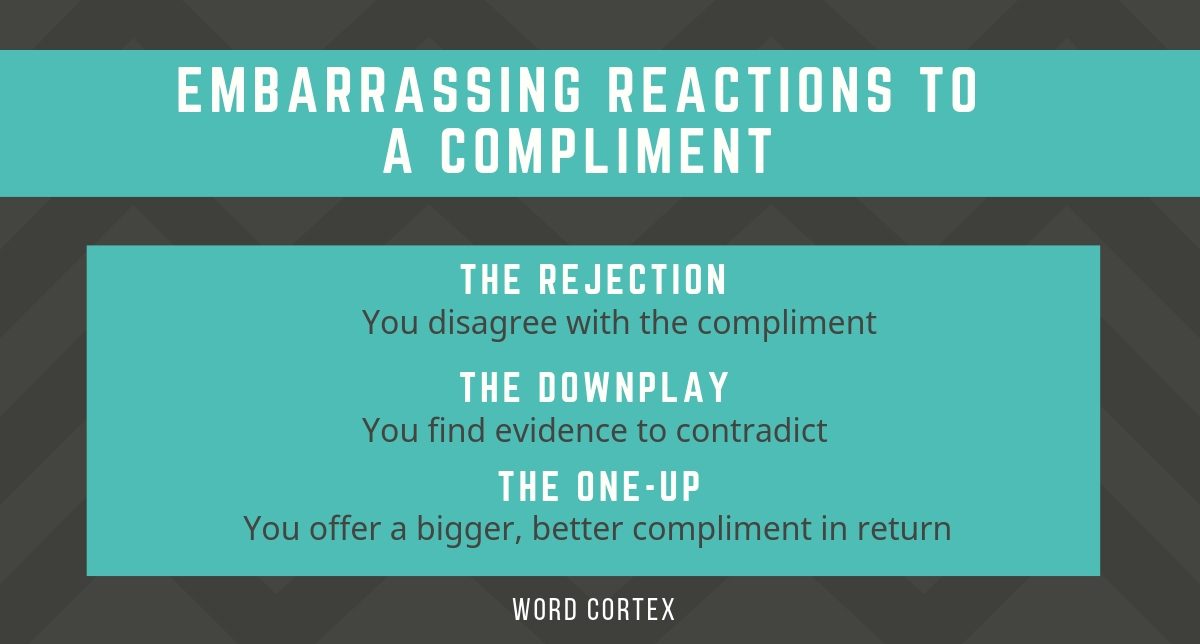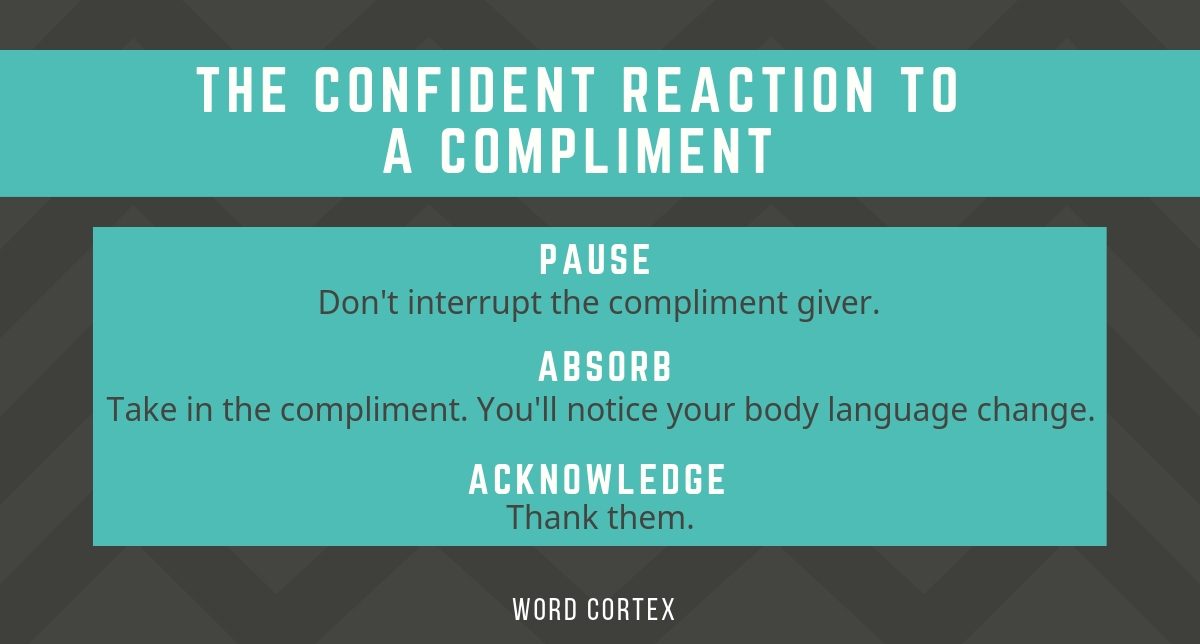How to Gracefully Take a Compliment
Every person around us wants to be appreciated and valued.
But hey, can we take a simple compliment? It seems to be a universal challenge.
In this article, we dig deeper into how to gracefully react to a compliment — and how not to!

Our embarrassing reactions to a compliment
From being around humans across different cultures in three different continents, I’ve noticed three awkward ways in which we typically react to a compliment.
Reaction type 1: THE REJECTION
This is where you directly contradict the compliment giver, making them wonder why they wasted their words on you.
Kind person: Hey, thanks so much for your work on the project. We couldn’t have made the deadline without your help.
You: (Brushes off) Oh naww, I didn’t really do anything.
Kind person: (Raises both eyebrows in confusion, forces a tight smile, and walks away.)
Reaction type 2: THE DOWNPLAY
This is where you not only contradict the compliment giver, but you make them feel like something’s wrong with them for even noticing.
Kind person: Cute shoes!
You: What, these? They’re 8 years old, and almost falling apart. I can’t believe I still wear them.
Kind person: (Wonders if they’re a fool.)
Rection type 3: THE ONE-UP
This is where, disarmed by the sheer kindness you’ve heard, you scramble for a compliment in return. Oh, and it’s gotta be better than the compliment you just received.
Kind person: You gave a great presentation today!
You: It’s not even half as good as the ones you give. Your confidence at last year’s conference was just amazing.
Kind person: (Wait, is this a contest?)
I’m notorious for one-upping. Once after a stage performance, an audience member came up to me and said, “That was a great show today! You were so good.” I nervously scanned my brain to find a return compliment for this kind stranger. Not being able to think fast enough, I blurted, “Oh, you were good too!” before watching his face flinch in utter confusion.
Despite the kind gesture of the compliment giver, each of these three interactions makes them feel awkward and simply flee the conversation.
Chances are that they may not want to compliment you again.
And before you know it, you’re complaining that you’re never appreciated, while eating a bucket of ice-cream, watching rom-coms on your couch. True story.

The confident way to take a compliment
Researchers have shown that people with lower self-esteem often struggle to take a compliment. Now, even if you’re somebody with a high self-esteem, your resistance to praise portrays that you’re unsure of your own capability; that it’s all a fluke somehow.
If you’d like to mold yourself as a confident person, all you have to do when receiving a compliment is say thanks.
How to react to a compliment: In three steps
Here’s a step-by-step process on how to gracefully take a compliment:
- Pause.
You might be tempted to interrupt the compliment giver even before he/she completes speaking due to the discomfort you’re experiencing. But control the urge to brush off their words before they’re done. Pause.
- Absorb.
Take in the compliment you just received. Give yourself a millisecond to do a tiny happy dance in your brain. I’m amazing! The moment you allow yourself to wholly take in the compliment, your body language will automatically change.
Many people inadvertently place their palm on the chest in response to a heartfelt compliment. This is your body’s way of showing that the compliment ‘reached your heart’. Some people may smile broadly, nod in agreement, or make an expansive gesture with their hands, striking a more ‘open’ body language, thereby signalling that they’ve absorbed those kind words.
These small changes in your body language, as you allow yourself to take in the compliment, show the person that they’ve had a positive impact on you.
- Acknowledge.
A simple “thank you” works as the perfect response to a compliment. You could also acknowledge the compliment in other words that basically serve to thank the person, for example, “It made my day.”
If you’d like to add more, do so after you’ve acknowledged the compliment. For example, if you’ve received a compliment for what was a team effort, you could first say thanks and then go on to mention your team. This way, you’re accepting the compliment while sharing credit.
Accepting a compliment with grace creates positive associations with the person who complimented you. It also shows that you’re confident and secure, and it adds more charisma to your personality.

CELEBRITY STYLE: What would [insert cool person] do?
The best way to learn is to learn from the best. How does your favorite celebrity react to the many compliments he/she receives. Is there something you can learn from their reaction?
In the video below, watch how President Obama uses the three-step process to react to Ellen DeGeneres’ compliment. After Ellen thanks him for all that he has done for the gay community, President Obama pauses, takes in the compliment (strikes an expansive hand gesture), and goes on to say, “Well, it’s one of the things I’m proudest of.”
Talk about a swag way to take a compliment! He didn’t reject or downplay Ellen’s words. He acknowledged it, and added on his thoughts without discomfort. This is the mark of someone who is confident in his capability and doesn’t wince when praised.
Obama did go on to compliment Ellen later in the clip. However, when he received the compliment, he didn’t immediately resort to ‘one-upping’ it. He took the time to acknowledge it first, then moved on to share appreciation for his host, Ellen.
Another example of taking a compliment without even having to say “thank you” out loud is the interaction below between Bradley Cooper and Oprah Winfrey. Even though Bradley was being interviewed here, he decided to take a moment to compliment Oprah for changing his life. In response, Oprah quietly let Bradley finish. She did not interrupt or downplay his words. Then, she placed her palm on her chest, gave a broad smile, and looked at the audience who, by now, was cheering for her.
You earned it
Downplaying a compliment is so ingrained in our culture that oftentimes it may feel almost unnatural to wholeheartedly accept it.
To start off, practice the three-step process in a low-stakes environment, for example, when your roommate or a friend or a complete stranger compliments you.
Once you’ve mastered these in a casual setting, it’ll gradually become easier for you to say, “Thank you,” with your head held high when a senior colleague or a boss compliments you.
You got this!
Anita



